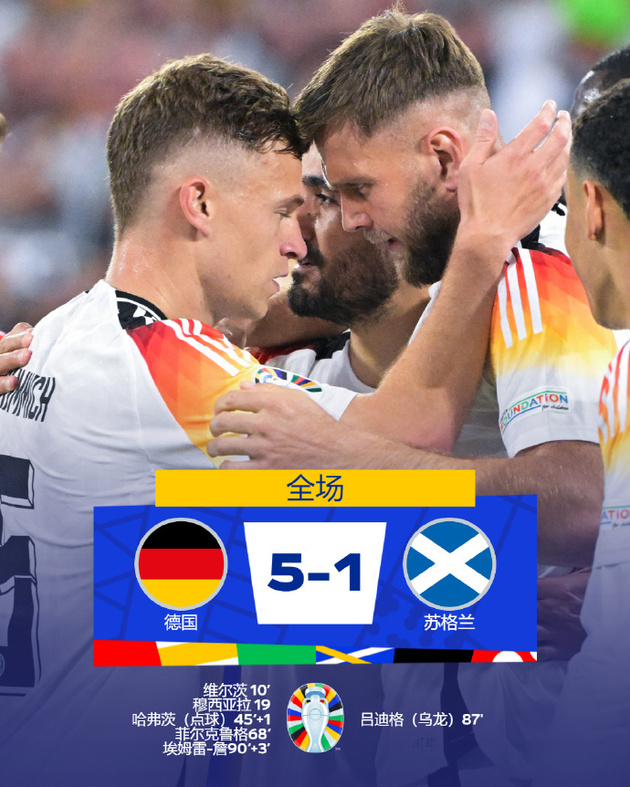
Photo/Weibo of UEFA European Championship
The quadrennial UEFA European Championship, commonly known as the Euros, kicked off in the early hours of June 15th, Beijing time. Host nation Germany triumphed over Scotland with a decisive 5:1 victory in the opening match at Munich’s Allianz Arena, marking a strong start to the tournament.
The Euros are often dubbed “the World Cup without Brazil and Argentina” and are recognized as one of the highest-level intercontinental football competitions globally, as well as one of the world’s most valuable sports IPs in terms of commercial value.
The expanding roster of sponsors indicates that the Euros are also a lucrative business. UEFA anticipates that the total revenue for this event will reach an unprecedented €2.4 billion, with broadcasting rights accounting for 60% or about €1.44 billion.
As the tournament progresses, from ticket sales to broadcasting income, and the hospitality and restaurant industries in the ten German host cities, the commercial value of the Euros is being fully unleashed. Behind this football extravaganza lies the anticipation and challenges for the German economy, as well as the prosperity and evolution of the global sports market.
NBD presents five key points you need to know about the 2024 Germany Euros.
Fact 1: The tournament features 24 teams competing in 51 matches, expected to attract a global audience of 5 billion views
The Euros, also known as “the World Cup without Brazil and Argentina,” include almost all major powerhouses of the football world, with England, France, Germany, Italy, and Spain all being former World Cup champions.
Each edition of the Euros is filled with excitement and suspense. For instance, the 2020 Euros were broadcasted in 229 countries and regions, with a cumulative viewership of 5.23 billion and an average of over 100 million viewers per match. The final alone attracted 328 million viewers.
For this year’s Euros, UEFA officially predicts a similar global viewership of 5 billion views, with about 3 million fans expected to travel to Germany to watch the games live. The first phase of ticket sales received 20 million applications; the second lottery draw received over 30 million ticket applications from 206 countries and regions, and the demand for final match tickets reached 2.2 million.
Fact 2: Ten German cities are hosting the event, with hotel bookings surging by more than 140% compared to the same period last year
This year’s Euros, the first full-scale event post-COVID-19 pandemic, will further boost the surrounding economy and is the largest sports event hosted in Germany since the 2006 World Cup. Officials estimate that 2.7 million spectators will visit the stadiums, with approximately 7 million tourists expected to flock to fan zones and public viewing areas.
The Euros are set to take place across ten German cities: Berlin, Munich, Dortmund, Gelsenkirchen, Stuttgart, Hamburg, Düsseldorf, Cologne, Leipzig, and Frankfurt. Data from Tongcheng Travel indicates that as of June 13th, hotel bookings in these cities for the latter half of June have increased by over 140% compared to last year, with Frankfurt, Munich, and Düsseldorf experiencing the highest demand.
Fact 3: The Euros could boost Germany’s Q2 GDP growth by 0.1%. In recent years, the European economy, led by Germany, has been sluggish
Against the backdrop of high inflation, high interest rates, and a global economic downturn, Germany, as the largest economy in the Eurozone, is eager to leverage the Euros to rejuvenate its economy.
According to data from the German think tank IFO, the Euros are expected to contribute a 0.1% increase to Germany’s GDP in the second quarter, approximately €1 billion. An analysis by the Halle Institute for Economic Research in Germany also suggests that the 2024 Euros are not expected to make a significant contribution to the growth momentum of the German economy. The report notes that there was almost no growth in the German economy following the 2006 World Cup, and this year’s Euros are also not expected to have a noticeable economic impact.
Fact 4: UEFA expects to rake in €2.4 billion, with broadcasting rights comprising 60% or about €1.44 billion
UEFA predicts that the total revenue for the 2024 Germany Euros will reach a record-breaking €2.4 billion.
Broadcasting rights have traditionally accounted for a significant portion of the Euros’ total income. For example, the previous Euros generated €1.135 billion in broadcasting rights revenue, with 140 broadcasters from 229 countries and regions participating in the event’s broadcast.
For the 2024 Germany Euros, broadcasting rights will continue to be the most important revenue segment, expected to account for nearly 60% of the total income, amounting to €1.44 billion.
Fact 5: Of the 13 sponsors, 5 are Chinese companies, setting a new record
From a commercial sponsorship perspective, the number of sponsors for this year’s Euros has expanded from 12 to 13.
According to UEFA, the 13 sponsors of this year’s Euros are: Adidas, AliExpress, Alipay, Yuanxun, Betano, Booking.com, BYD, Coca-Cola, Hisense, Lidl Supermarket, Engelbert Strauss, Qatar Tourism, and Vivo. Among them, Hisense, Alipay, Vivo, AliExpress, and BYD are five Chinese brands that have entered the fray. These five Chinese companies have once again set a new record for Chinese corporate sponsorship of the event.
For the brand sponsors of the Euros, the most effective benefit among all event rights is the presentation of LED advertisements during the 51 matches. For a 90-minute match, on average, each sponsor receives 7 minutes of exposure.


 川公网安备 51019002001991号
川公网安备 51019002001991号





